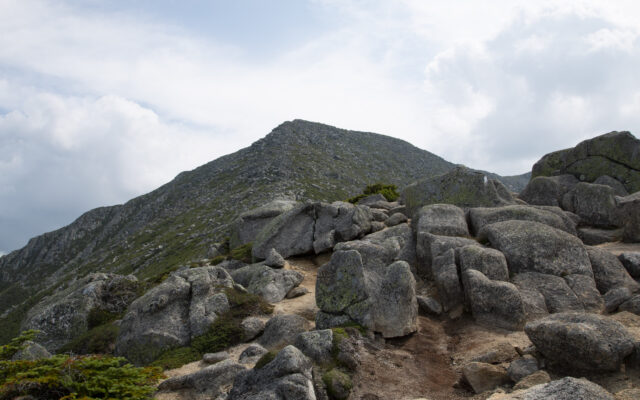
Wabanaki place names are everywhere in Maine
By Emily Burnham, Bangor Daily News Staff
Before many were replaced by English or French names, most places in what is now Maine had already been named by the original inhabitants of the land: the Wabanaki, or the People of the Dawn, who include today’s Penobscot Nation, Passamaquoddy Tribe, Houlton Band of Maliseets and the Aroostook Band of Micmacs, or Mi’kmaq.
There are still many Wabanaki names that dot the landscape of Maine, which is known as the Dawnland, though their meanings can be lost on most people as they climb Katahdin, vacation in Kennebunk, or drive over a bridge across the Kennebec River.
Penobscot language master Carol Dana said even Wabanaki people themselves sometimes don’t even know the meaning of the words — though the words themselves sometimes reveal hidden truths about long-forgotten history and culture.
“The word Penobscot refers to the widening river down near what’s now Bucksport and Orland, because our main village, before contact, was down that far along the river, before we moved back up to where we are now,” Dana said. “Our people don’t even know that. But it’s the language that cues you in.”
To celebrate Indigenous Peoples’ Day this year, we’ve compiled a list of some of the place names in Maine that come from the Wabanaki languages. Generally, these words are from the Eastern Algonquin language group that encompasses the dialects of Penobscot, Passamaquoddy, Maliseet and Mi’kmaq. Where noted, words may come specifically from one of those dialects. Most of these translations came from Dana, and from Bates College’s map of Wabanaki place names in western and southern Maine.
Allagash: Rough translation means “bark shelter,” or “bark cabin,” or possibly “camp on the lakeshore.”
Aroostook: Means “beautiful river.”
Androscoggin: Rough translation means “place where you smoke meat or fish at the falls.”
Caribou: From “kalibu,” meaning “shoveler” or “gets food by shoveling or pawing.”
Carrabassett: A word from the Norridgewock tribe specifically, referring to a chief who died at the hands of white settlers. Dana believes his name translates to “one who turns around quickly.”
Cobscook: Maliseet-Passamaquoddy, means “boiling tides,” referring to the huge tidal range along Cobscook Bay.
Damariscotta: Unclear origins or translations, though various sources say it means something akin to “place of many alewives” or “place of many fish.”
Katahdin: Penobscot specifically, means “the greatest mountain” or “elder mountain.”
Embed
Kennebec: Means “large body of still water” or “long quiet water.” This likely does not refer to the river itself; it may refer to Moosehead Lake, the source of the river, or to the wider, less fast-flowing waters near the river’s end.
Kennebunk: Means “long sand bar” or “long cut bank,” likely referring to Great Hill, a steep and striking glacial moraine at the mouth of the Mousam River.
Kenduskeag: Maliseet or Penobscot, “eel weir place,” “eel catching place” or “little eel river.” Penobscot language researcher Frank Siebert claimed it meant “place of parsnips,” but Dana isn’t sure that’s correct.
Kineo: “Sharp peak” — a double meaning, referring to both the sheer cliff face of Kineo, and to the rhyolite rocks there that were perfect for making into arrowheads and other pointed tools.
Machias: Passamaquoddy, means “bad little falls,” referring to the Machias River waterfalls in the center of town.
Madawaska: Believed to mean “land of the porcupines” in Mi’kmaq.
Millinocket: Dana says it translates to “island of variable shape.” Another related translation is “dotted with many islands” or “land of many islands.”
Monhegan: Maliseet or Mi’kmaq, meaning “out to sea island.”
Norridgewock: The correct name of the tribe for which the present town was named is Nanrantsouak, meaning “people of the still water between the rapids.”
Ogunquit: Means “sandbar lagoon at river mouth,” referring to the Ogunquit River that runs parallel to sand dunes before emptying into the ocean.
18684143
Passadumkeag: Penobscot, means “quick water” or “rapids over gravel beds.”
Passamaquoddy: Anglicized from Peskotomuhkat, meaning “people from the place where pollock is abundant.”
Piscataquis: Means “at the river branch,” or “branch of the river.”
Penobscot: Anglicized from Penawapskewi, meaning “place of descending white rocks or ledges,” referring to where the Penobscot River widens and becomes rocky, near where Bucksport and Orland are today.
Sagadahoc: “Where the river pours into the sea,” referring to the Kennebec River south of Merrymeeting Bay.
Saco: From the word Shawacotuc, meaning “where the river flows out.”
Sebago: “Big still water,” referring to Maine’s second-largest lake.
Sebasticook: From the Penobscot, means “almost through place” or “short passage river,” referring to the short portage to the Souadabscook Stream, which connects the Penobscot and Kennebec rivers.
Skowhegan: “A place to watch,” or “watching place for fish.”
Wiscasset: “Hidden outlet,” referring to a bend in the Sheepscot River.